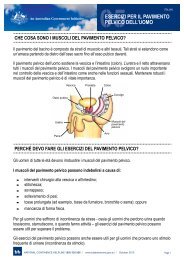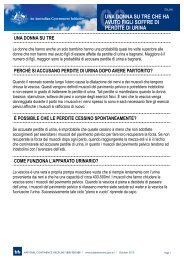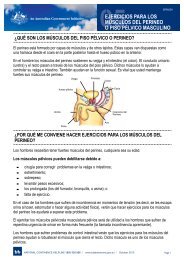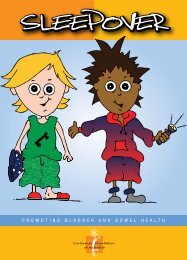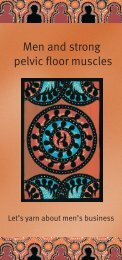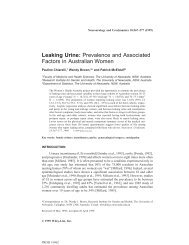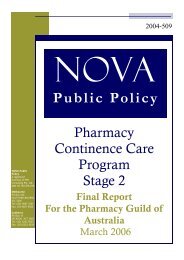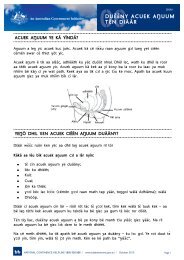Continence Tools for Residential Aged Care - Bladder and Bowel ...
Continence Tools for Residential Aged Care - Bladder and Bowel ...
Continence Tools for Residential Aged Care - Bladder and Bowel ...
Create successful ePaper yourself
Turn your PDF publications into a flip-book with our unique Google optimized e-Paper software.
24<br />
11. <strong>Bladder</strong> <strong>and</strong> bowel symptoms <strong>and</strong> conditions<br />
that warrant further attention<br />
The <strong>Continence</strong> <strong>Tools</strong> <strong>for</strong> <strong>Residential</strong> <strong>Aged</strong> <strong>Care</strong> are<br />
designed to be completed by any level of staff. At the<br />
same time, it is important that all levels of staff are<br />
able to work together as a team <strong>and</strong> to identify bladder<br />
<strong>and</strong> bowel symptoms that warrant further attention.<br />
Although incontinence is not a life threatening condition,<br />
it is usually a sign of an underlying problem or health<br />
condition. To assist staff to identify residents who require<br />
further assessment, the tools include a number of alerts<br />
<strong>for</strong> staff to notify a Registered Nurse or Enrolled Nurse,<br />
<strong>Continence</strong> Nurse or the resident’s General Practitioner.<br />
Symptoms or factors<br />
that warrant further<br />
attention<br />
Resident resistance to<br />
assistance with toileting<br />
or changing<br />
Voiding < 3 times during<br />
day<br />
Voiding > 6 times during<br />
the day<br />
Voiding > 2 times during<br />
the night<br />
The use of a urinary<br />
catheter<br />
<strong>Bowel</strong> motions < 3 times<br />
per week<br />
Pain <strong>and</strong>/or discom<strong>for</strong>t<br />
when using bowels<br />
Rationale<br />
The resident may have an underlying condition that is causing them to resist care. This<br />
may be modifiable <strong>and</strong> require a behavioural management plan. Consider also whether<br />
or not the resident underst<strong>and</strong>s the care that is required <strong>and</strong> how they might interpret<br />
staff actions.<br />
If the resident has difficulty voiding <strong>and</strong>/or voids infrequently, this may indicate a<br />
prostate problem (in men) or a neurological problem that results in incomplete bladder<br />
emptying. The symptom should be considered in relation to other symptoms (i.e.<br />
a sensation of incomplete bladder emptying etc). A medical assessment may be<br />
warranted.<br />
If the resident voids frequently during the day <strong>and</strong>/or night, this may indicate an<br />
underlying health problem that requires attention or it may be the result of medication.<br />
The symptom should be considered in relation to other symptoms (i.e. urgency, urge<br />
incontinence, symptoms of UTI etc). A medical assessment may be warranted.<br />
Residents with indwelling urinary catheters are at high risk <strong>for</strong> developing bladder<br />
infection. It is important to develop a catheter care plan that minimises catheter related<br />
problems. A medical assessment <strong>and</strong>/or involvement of a <strong>Continence</strong> Nurse may be<br />
warranted. The catheter should not be removed unless it is clear that it is safe to do so<br />
<strong>and</strong> that the resident will be able to independently void. Catheters should be avoided<br />
<strong>for</strong> continence management unless there is a clear benefit to the resident.<br />
Individual vary widely in how frequently they use their bowels, however most people<br />
defeacate 3 times a week or more. If they defeacate less than 3 times a week, <strong>and</strong> also<br />
have a hard stool that is difficult to pass, this may indicate constipation. Healthy bowel<br />
elimination is primarily characterised by regular bowel movements, a soft, <strong>for</strong>med stool<br />
<strong>and</strong> a stool that is easy to pass (i.e. no straining). The resident may require increased<br />
fibre, fluid, activity or laxatives to achieve this.<br />
Pain/discom<strong>for</strong>t during defeacation is not normal <strong>and</strong> should be investigated. It may<br />
indicate an underlying pathology such as haemorrhoids or they may be constipated.



